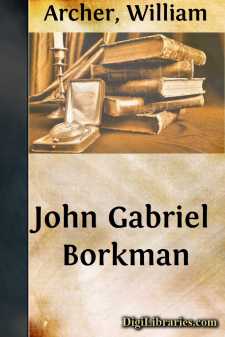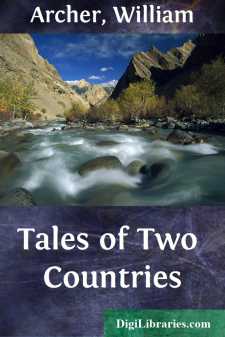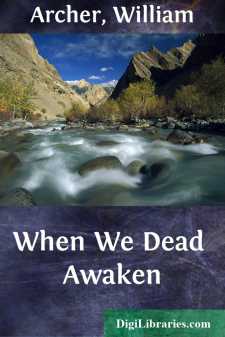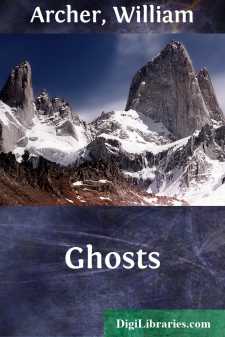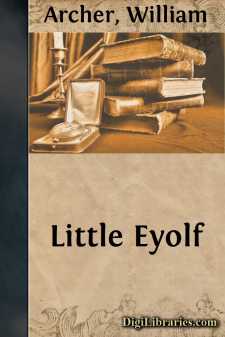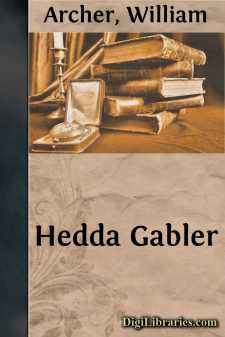Categories
- Antiques & Collectibles 13
- Architecture 36
- Art 48
- Bibles 22
- Biography & Autobiography 813
- Body, Mind & Spirit 142
- Business & Economics 28
- Children's Books 17
- Children's Fiction 14
- Computers 4
- Cooking 94
- Crafts & Hobbies 4
- Drama 346
- Education 46
- Family & Relationships 57
- Fiction 11829
- Games 19
- Gardening 17
- Health & Fitness 34
- History 1377
- House & Home 1
- Humor 147
- Juvenile Fiction 1873
- Juvenile Nonfiction 202
- Language Arts & Disciplines 88
- Law 16
- Literary Collections 686
- Literary Criticism 179
- Mathematics 13
- Medical 41
- Music 40
- Nature 179
- Non-Classifiable 1768
- Performing Arts 7
- Periodicals 1453
- Philosophy 64
- Photography 2
- Poetry 896
- Political Science 203
- Psychology 42
- Reference 154
- Religion 513
- Science 126
- Self-Help 84
- Social Science 81
- Sports & Recreation 34
- Study Aids 3
- Technology & Engineering 59
- Transportation 23
- Travel 463
- True Crime 29
William Archer
William Archer (1856-1924) was a prominent Scottish critic, translator, and writer, known for his influential work in theater criticism. He played a key role in introducing the plays of Henrik Ibsen to the English-speaking world, significantly impacting the development of modern drama. Additionally, Archer was a fervent advocate for the "New Drama" movement, emphasizing realism and social issues in theatrical productions.
Author's Books:
Sort by:
by:
William Archer
LETTER I The Straits of New York—When is a Ship not a Ship?—Nationality of Passengers—A Dream Realized. R.M.S. Lucania. The Atlantic Ocean is geographically a misnomer, socially and politically a dwindling superstition. That is the chief lesson one learns—and one has barely time to take it in—between Queenstown and Sandy Hook. Ocean forsooth! this little belt of blue water that we cross...
more...
by:
William Archer
INTRODUCTION.* The anecdotic history of John Gabriel Borkman is even scantier than that of Little Eyolf. It is true that two mentions of it occur in Ibsen's letters, but they throw no light whatever upon its spiritual antecedents. Writing to George Brandes from Christiania, on April 24, 1896, Ibsen says: "In your last letter you make the suggestion that I should visit London. If I knew enough...
more...
by:
William Archer
INTRODUCTION. In June, 1867, about a hundred enthusiastic youths were vociferously celebrating the attainment of the baccalaureate degree at the University of Norway. The orator on this occasion was a tall, handsome, distinguished-looking young man named Alexander Kielland, from the little coast-town of Stavanger. There was none of the crudity of a provincial dither in his manners or his appearance. He...
more...
by:
William Archer
INTRODUCTION. From Pillars of Society to John Gabriel Borkman, Ibsen's plays had followed each other at regular intervals of two years, save when his indignation over the abuse heaped upon Ghosts reduced to a single year the interval between that play and An Enemy of the People. John Gabriel Borkman having appeared in 1896, its successor was expected in 1898; but Christmas came and brought no...
more...
by:
William Archer
THE GREAT ADVENTURER When it was known that Mr. H. G. Wells had set forth to discover God, all amateurs of intellectual adventure were filled with pleasurable excitement and anticipation. For is not Mr. Wells the great Adventurer of latter-day literature? No quest is too perilous for him, no forlorn-hope too daring. He led the first explorers to the moon. He it was who lured the Martians to earth and...
more...
by:
William Archer
The Master Builder—or Master Builder Solness, as the title runs in the original—we enter upon the final stage in Ibsen's career. "You are essentially right," the poet wrote to Count Prozor in March 1900, "when you say that the series which closes with the Epilogue (When We Dead Awaken) began with Master Builder Solness." "Ibsen," says Dr. Brahm, "wrote in...
more...
by:
William Archer
ACT FIRST. [A spacious garden-room, with one door to the left, and two doors to the right. In the middle of the room a round table, with chairs about it. On the table lie books, periodicals, and newspapers. In the foreground to the left a window, and by it a small sofa, with a worktable in front of it. In the background, the room is continued into a somewhat narrower conservatory, the walls of which...
more...
by:
William Archer
INTRODUCTION. Little Eyolf was written in Christiania during 1894, and published in Copenhagen on December 11 in that year. By this time Ibsen's correspondence has become so scanty as to afford us no clue to what may be called the biographical antecedents of the play. Even of anecdotic history very little attaches to it. For only one of the characters has a definite model been suggested. Ibsen...
more...
by:
William Archer
From Munich, on June 29, 1890, Ibsen wrote to the Swedish poet, Count Carl Soilsky: "Our intention has all along been to spend the summer in the Tyrol again. But circumstances are against our doing so. I am at present engaged upon a new dramatic work, which for several reasons has made very slow progress, and I do not leave Munich until I can take with me the completed first draft. There is little...
more...
by:
William Archer
INTRODUCTION In accordance with classic precedent, this anthology ought to have consisted of "1,001 Gems of German Thought," I have been content with half that number, not—heaven knows!—for any lack of material, but simply for lack of time and energy to make the ingathering. After all, enough is as good as a feast, and I think that the evidence as to the dominant characteristics of German...
more...



